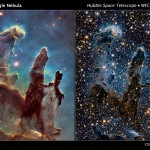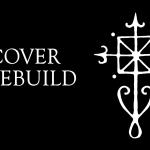I had something like a spiritual experience watching a movie recently.
The movie Lucy is not what I would call a “good” movie. Starring Scarlett Johansson, Lucy is about a young woman who is kidnapped and has an bag of a new recreational drug implanted in her abdomen against her will. She is then forced to “mule” the drug across international borders. In the process, the bag is perforated and she absorbs a very large dose of the drug into her system. As a result, she begins to be able to access larger and larger percentages of her brain. She gains superhuman abilities, starting with extraordinary reflexes and perception and increasing until she can control matter and even the flow of time.
What made the movie stand out for me was a montage of images which Lucy experiences connecting her both to her remote ancestral past — in the form of her primate ancestor “Lucy” — and to the universe as whole — in the form of mind-blowing macrocosmic vistas. It was little Kubrick 2001-ish. As I walked out of the theater, I had this intense feeling of both our infinitesimal insignificance and our inestimable consequence as a species. I don’t know if this was the intent of the movie, but I was left with an intense feeling both of radical dissociation from the everyday concerns of my life and of deep responsibility to the universe as a whole.
One of the insights of deep ecology is that we humans are members of a vast more-than-human community. Deep ecology calls us to a new humility in the face of this fact, challenging us to abandon our anthropocentric perspective. It reminds us that we are made of the same stuff as the living world around us and that our ultimate destiny is the same as all the other-than-human beings on Spaceship Earth: namely to continue our journey as recycled star dust. In the vast scheme of things, our individual lives are barely blips in the evolution of the cosmos. Even as a species, we don’t seem all that important in the grand scheme of things, having only been around 2/1000 of one percent of the life of the universe. In short, we are not special.
And yet, we are at least one of the lifeforms through which the universe has become conscious of itself. And that makes us special.
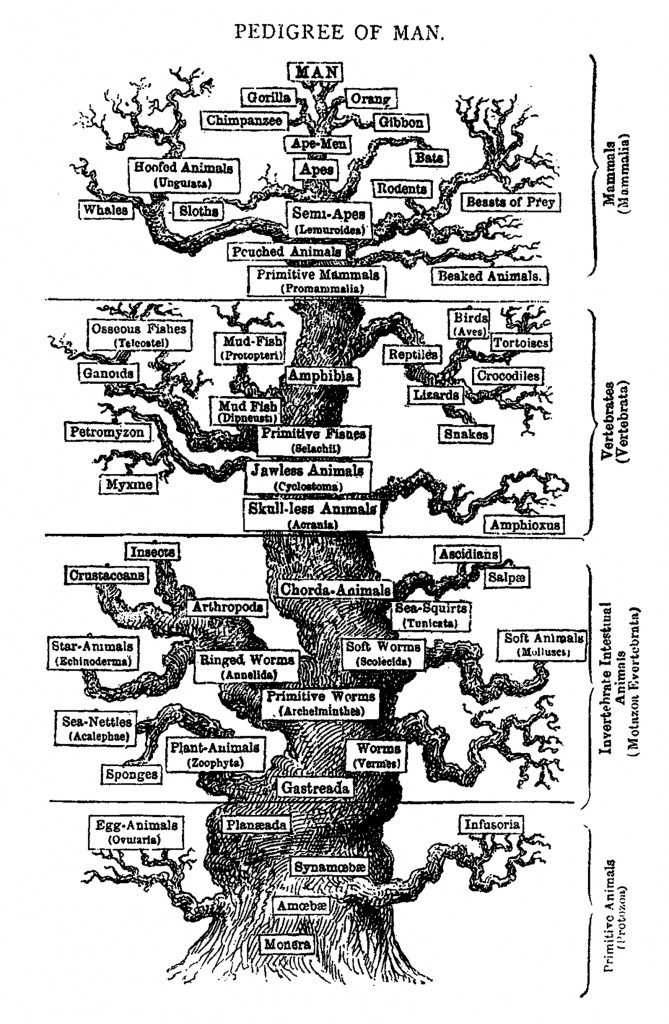
Models of Evolution: To be special or not to be
There are basically three models for understanding our evolutionary history (four, I guess, if you count the theory that God plopped Adam and Even down in the Garden of Eden … which I don’t count). The first is the model of the evolutionary ladder or pyramid or tree, which depicts the evolution of biological life as a progression which culminates with human beings at the top — the “crown of creation”. I call this the “Special” model — as in “Human Beings are Special”. This is the comfortable model of evolution, because it places us at the top.
One of the problems with this model is that it perpetuates the conceit that human beings are somehow inevitable in an evolutionary sense. But, according to some critics of this model, if we were to replay evolution, there is virtually no chance that humans beings would appear again. This model also perpetuates the notion that human beings are “more evolved” than other species. But the fact is that all species that are alive today have been evolving for the same amount of time — 3.8 billion years — it’s just that some species have not had to change much in order to survive over that period.
Another criticism of the this model is that it implies that evolution has a direction or a purpose. Even secular people can fall into the trap of teleological thinking, writes fellow Patheos writer, Connor Wood:
“… when queried, secular supporters of ‘evolution’ often can’t describe Darwin’s theory any better than a fourth-grader. Most of them tend to fall back on a kind of vaguely Spencerian, embarrassingly teleological understanding of things, one that imputes goals and purposes in evolutionary development, that assumes ‘evolution’ means ‘glorious forward march of advancement!’ In other words, they utterly fail to understand the goalless, meandering nature of Darwinian theory.”
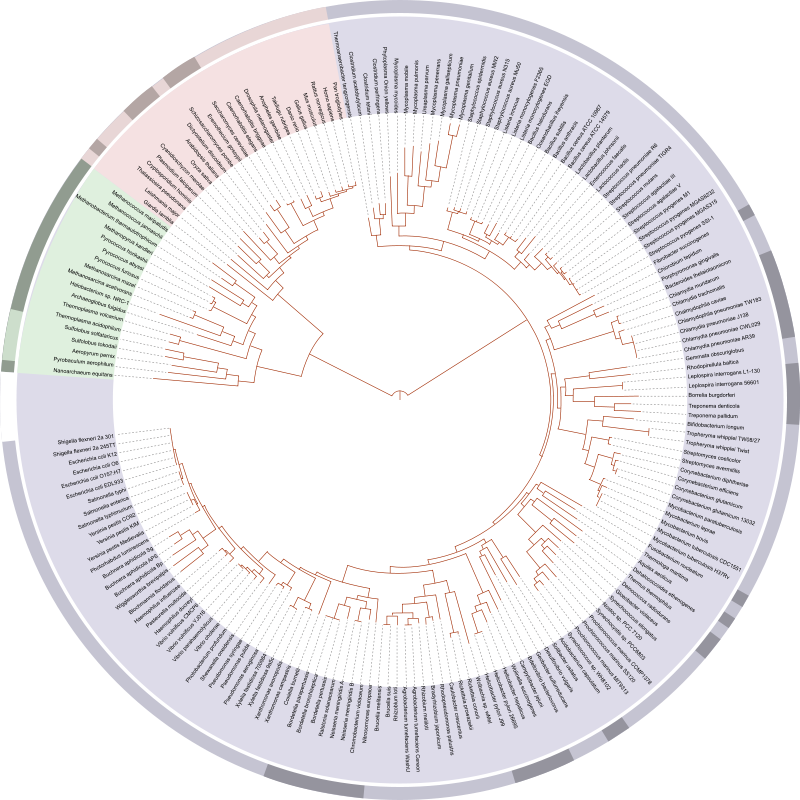
An alternative model of evolution depicts the process less like a tree, and more like a bush, in that it does not have a “top”. Humans are just one among many other species, with nothing setting us apart. I call this the “Not Special” model — as in “Human Beings Are Not Special”. There are various ways to depict this, but the central idea is that evolution is not a hierarchical process. This brings human beings down to the same “level” as bacteria, in evolutionary terms. In these models, it is sometimes difficult to locate where homo sapiens even are in the scheme.
This is the model favored by many deep ecologists. One of the goals of deep ecology is “democratize” the biotic community, unseating homo sapiens sapiens from their privileged position as the self-assumed royalty of the evolutionary kingdom and bringing humans back “down to earth”, literally and figuratively.
Some critics of the “Not Special” model object that it calls into question our very right to exist, since we have to consume members of other species to survive. This is a specious argument, as it confuses evolutionary hierarchy with the food chain. The food cycle of which we are a part consists of beings eating other beings at every level. Predators consume herbivores and herbivores consume plants, but both predators and herbivores are then consumed by decomposers, which then become food for plants.
But what if the survival of our species requires the extinction of another species — like maybe the bacteria that cause bacterial meningitis. Again, all species, wherever they fall on the “bush” of evolution are fighting for survival. I don’t think leveling the evolutionary playing field means we have to question our “right” to survive. The more salient question is not whether we have a right to fight for our lives or the perpetuation of our species, but our “right” to exterminate other species out of ignorance, negligence, laziness, or a desire for a slight increase in our already historically unprecedented comfort level.
From my perspective, one of the problems with the “Not Special” model of evolution is that it fails to account for the way in which human are special, i.e., our self-consciousness as an emergent property of a complex evolutionary system. And perhaps even more importantly, it fails to offer a compelling motivation for humans to identify with anything other than our own species. In the “Special” model of evolution, human beings might at least think of themselves as “stewards” of the earth. But if there is really nothing distinguishing us from bacteria, as in the “Not Special” model, then why should we care about other species except to the extent that we need them in order to survive? This brings me to a third model of evolution …
Cosmic Evolution
As noted above, if we were to go back in time and reset the course of evolution, it is highly unlikely that we would be here the second time around. On the other hand, according to some theorists at least, it is highly likely — perhaps inevitable — that some form of tool-using, self-conscious species would evolve. (For example, self-consciousness might be a form of convergent evolution.) While many biologists emphasize the directionlessness of evolutionary history, many physicists are now identifying a developmental trend in cosmic history, one moving toward localizations of increasing order and complexity which operate against the general entropic trend of the universe. If this is true on the cosmic scale, it is arguably true on a biological scale as well.
Philosopher Ken Wilbur argues that by portraying humankind as merely one strand in the web of life, deep ecology assumes a one-dimensional or “flatland” metaphysics. According to Wilbur, a “deeper” ecology would perceive that the cosmos is hierarchically ordered in terms of complexity. Hierarchy does not imply dominion, though — it implies responsibility. This brings me to the third model of evolution, one which combines the insight that human beings are both special and not special. In this “Special/Not Special” model, the universe itself is evolving toward self-consciousness. One step in that evolution of the universe is the development of beings who are self-conscious. In other words, at some point in its evolution, the universe goes from being unconscious to having parts of itself — us — become aware of themselves as parts, as a stage in the process of the whole becoming aware of itself. In this sense, we are special. We as a species represent a point at which the universe has moved closer to self-consciousness. As a result, we have special responsibilities toward other species and the universe as a whole.
Alison Leigh Lilly has cogently criticized hierarchical models of evolution as being a form of “weak anthropocentrism”, in so far as they fail to challenge the supremacy of human culture and consciousness. Alison may be right, but there are few caveats that I think at least mitigate the latent anthropocentrism of this model of cosmic evolution:
First, it must be recognized that human beings are not the only beings that are self-conscious, much less the only beings that are conscious. As Barbara Ehrenreich writes in Living with a Wild God,
“The scientific notion that humans are the only conscious beings on the planet had been an error all along, an error rooted in arrogance and provincialism. … By the 1980s, science was beginning to move toward an acknowledgement of animal subjectivity and emotions, but for the most part educated humans were stuck with the Cartesian view of animals as automatons, driven entirely by instinct and reflex, which is a way of saying that they are in fact, for all practical purposes, already dead, just mechanisms responding to instinct and external stimuli. … When observed through a lens cleaned of human vanity, more and more types of animals, many birds included, are found to reason, cooperate, use tools, and plan ahead.”
In addition, there are other animals that are likely self-conscious, most notably other primates (chimpanzees and gorillas) and the cetaceans (dolphins and whales), but also elephants and magpies. And that’s not even counting lifeforms on other planets. So, while we may be in a special group, we humans are not unique. And, it should be mentioned that even the species that are not self-conscious, have the potential to evolve into species that are self-conscious. Every species is a manifestation of the universe’s drive toward self-consciousness, and as such, every species has inherent value.
Second, it must also be recognized that human beings are not the end of evolution. Homo sapiens sapiens will disappear one day. We may evolve into another species. Or we may go the way of the homo neanderthalensis, leaving the whales to take the next step in the evolution of cosmic self-consciousness. So, while there is a hierarchy of evolution (based on degrees of complexity), human beings are not really at the “top”. The “top” is reserved for the universe as a whole.
There is a common belief that we have “evolved out of evolution”, that through the development of tools, we no longer need to evolve biologically, because we can develop a technological solution to any challenge. But, I think it is becoming increasingly dubious whether we will be able to solve all of our problems technologically, since our technological paradigm seems to be at the root of many of our problems. In addition, I think it’s a mistake to see technology as somehow “outside” of the process of biological evolution. The notion that technology allows us to escape our biology perpetuates the nature-culture dichotomy, which again is at the root of our problems.
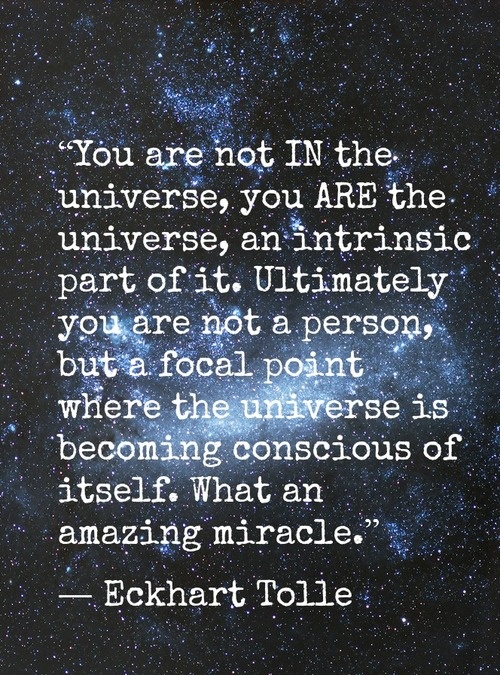 Third, and finally, I think maybe it is a mistake to focus on the evolution of individual species. We might say that we are not evolving, but that the universe is evolving, and we are only a part of the evolving universe. I cannot emphasize this point enough — because it encapsulates the sense in which we both are and are not special. We are special only to the degree to which we advance the evolution of the cosmos as a whole. What this means is that we evolve, not by increasing our technological control over nature, but by deepening our identification with the self-evolving cosmos. As we dissociate from our narrow ego-selves, and identify with the interconnected web of life, then the universe takes a step forward toward complete self-consciousness. One way or another, our sense of ourselves as beings existing separately from the rest of the universe has to be overcome. In a sense, we have to disappear in order to fulfill our destiny. And if we don’t, then we will disappear in another way, likely through self-destruction.
Third, and finally, I think maybe it is a mistake to focus on the evolution of individual species. We might say that we are not evolving, but that the universe is evolving, and we are only a part of the evolving universe. I cannot emphasize this point enough — because it encapsulates the sense in which we both are and are not special. We are special only to the degree to which we advance the evolution of the cosmos as a whole. What this means is that we evolve, not by increasing our technological control over nature, but by deepening our identification with the self-evolving cosmos. As we dissociate from our narrow ego-selves, and identify with the interconnected web of life, then the universe takes a step forward toward complete self-consciousness. One way or another, our sense of ourselves as beings existing separately from the rest of the universe has to be overcome. In a sense, we have to disappear in order to fulfill our destiny. And if we don’t, then we will disappear in another way, likely through self-destruction.
Cosmic evolution is not a new idea, of course, even for Neo-Paganism. For example, Tim (Oberon) Zell of the Church of All Worlds taught as early as 1971 that humans and cetaceans are part of the “nervous system” of a single planetary organism, Gaea, which is evolving toward an “emerging planetary consciousness” — a kind of biological apotheosis (an idea influenced by Pierre Teilhard de Chardin). But Zell also speculated whether human beings might better be compared to a cancer that is multiplying out of control within the body of Gaea.
Our destiny
I’ll admit that the idea that human beings are in any way “equal” to bacteria wounds my pride. I react instinctively against it, and it likely colors my opinions. “How can human beings be equal with bacteria? We have big brains and opposable thumbs. We make tools and we are self-conscious.” And, of course, these things are true. But why are these adaptations necessarily any better than the adaptations of bacteria? Or sharks? who seem to have done pretty well for themselves in the last half billion years. (This is a question that Jeff Lilly takes up in the comments to Alison’s post mentioned above.) It is possible, I have to admit, that tool making and self-consciousness are not real evolutionary advantages. In fact, our technology and our consciousness of ourselves as separate from the rest of nature both seem to be at the root our headlong drive to destroy our own environment and thus ourselves. It may be that these things which make us “special” are actually maladaptive. And it may be that the notion of a universe that is evolving consciousness is appealing because it flatters our egos and perpetuates the belief that self-consciousness makes us special. Perhaps it is just another way of creating God (i.e., the universe) in our own image.
I don’t have answers to these questions yet. But I am left with the feeling that I had when I walked out the movie Lucy: We are special, not in the sense that we have special privileges, but in the sense that we have special responsibilities. We have a responsibility to evolve toward what deep ecologists call “Self-realization”, a paradigmatic shift in our consciousness, from one of radical separateness to one of radical interconnectedness. And I also wonder if we might have a responsibility to help “shepherd” other species toward the same destiny, although I imagine this would be less like the genetic engineering which science fiction author David Brin describes in his Uplift books, and more like making space for other species to flourish.
We have a choice: Humanity will either commit itself to furthering the evolution of cosmic consciousness or we will continue our headlong rush to self-destruction (and probably take a good part of the biosphere with us in the process). If we are to take the former path, we must come to understand these truths, outlined by Michael Zimmerman:
- Humanity emerges from and is part of the rest of life.
- Life is a self-organizating web and we must cease trying to control mechanically.
- The earth community is itself sacred.
- Human morality must be attuned to the “languages” of the larger Earth community.
- We must encourage the flourishing of all life, human and other-than-human.







